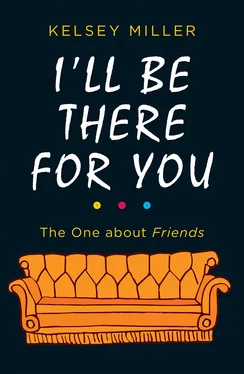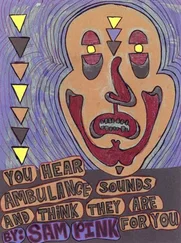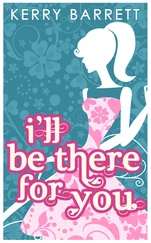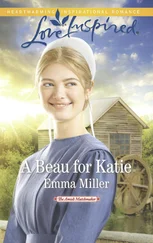Marta Kauffman and David Crane met in 1975, at Brandeis University. In 2010, Kauffman and Crane were interviewed by the Television Academy Foundation, where their story would be preserved for future generations of creatives and cultural historians. By then, the creators of Friends had long since ended their landmark show as well as their professional relationship. But their legendary rapport and synchronicity was undiminished. This was a duo that, from their early days in Hollywood, were known for their preternatural chemistry, finishing each other’s sentences and pitching network executives with uncanny energy and ease. In that 2010 interview, when asked to tell the story of how they first met, they replied in tandem, without skipping a beat: “He was a street urchin,” Kauffman began. On cue, Crane concluded: “And Marta was a whore.”
Onstage, that is. They were both acting students at the time, and had been cast in a production of the Tennessee Williams play Camino Real . It would be nice to view this first meeting through the lens of destiny, imagining a young Kauffman and Crane instantly recognizing themselves as kindred from the start. The truth, though, has a lot less fairy dust. The truth sounds a lot more like everyone else’s college theater stories: they met, did the play, and then never really hung out after that.
Two years passed. Kauffman went abroad for her junior year, and by the time she returned to school, she’d decided to try working behind the scenes. She enrolled in a directing course, which Crane was taking, too, having recently come to the realization that, as an actor, he was “really not good.” Kauffman didn’t yet know this, so when she was assigned to direct a production of Godspell , she asked her old castmate to be in it. “And he said, ‘No. But I’ll direct it with you?’”
Two directors on one show can often become a too-many-cooks situation, particularly when the cooks are two young, ambitious theater students. Dueling egos and clashing creative visions can spoil the production and make mortal enemies out of the competing codirectors. But, at least in their recollection, Kauffman and Crane’s first collaboration was precisely the opposite. It was easy and it was a blast . Having been relative strangers before, they now fell into an instant and easy rapport. Already, they were completing one another’s sentences, working in sync like seasoned producing partners. “It was one of those relationships where you very quickly realize, This is fun ,” says Kauffman.
They had fun codirecting Godspell and so decided to do another play, and then another. There was no formal agreement, but Kauffman and Crane now realized they both enjoyed creating theater, maybe more than performing—and they enjoyed it even more when creating it together.
“I don’t even know which of us said it,” Crane recalled. But, on a whim, one of them suggested they write something. The way he tells it, the decision to become writing partners went something like: “Yeah, let’s write something! It’ll be a musical! Sure!” Kauffman shrugged and nodded. “We have a barn.”
Neither had ever written a play, let alone a musical. So they did what one is supposed to do in college: experimented. They booked a theater space and commissioned classmates Seth Friedman and Billy Dreskin 1to help out.
This play would become the first Kauffman-Crane production, titled Waiting for the Feeling . (It was exactly what it sounds like, according to Kauffman: “An angst-driven, collegiate, ‘comedy’” about how hard it is to be a college student.) Still, the experience confirmed what they’d first come to realize while directing Godspell . They clicked. They were good (if still juvenile) writers. They understood each other, but also complemented one another. Crane was analytical, his focus homed in on the words on the page. Kauffman was better with emotion, and enjoyed the creative work of taking a story from script to stage and, later, to screen. Down the line, during the production of Friends , Crane preferred to stay in the writers’ room, tweaking jokes and refining stories, while Kauffman did much of the creative producing on set, checking wardrobe, watching camera blocking, and hashing scenes out with the actors.
What made Kauffman and Crane such a strong team was the fact that they could put their heads together and create something, and then step apart to execute their vision in slightly separate roles. They had talent and dynamism and extraordinary work ethic, but they also had trust. On this foundation, the pair would go on to forge a lifelong friendship, and a twenty-seven-year creative partnership, which would forever alter the trajectory of both network and cable television programming. It was a natural, comfortable interdependence. Together, they just worked.
When people wonder about that ineffable magic that made Friends such a hit, much credit (if not all credit) is given to the cast. But Kauffman and Crane were the primary ingredient, no question. It was not only the fortitude of their professional relationship, but the intimacy and trust within their personal one. They were the original friends.
Kauffman and Crane moved to New York after college, pursuing the musical-theater career they’d begun at Brandeis. They wrote their next show, Personals , along with former classmate Seth Friedman. It was a musical revue about the people behind newspaper personal ads, featuring music and lyrics by none other than Alan Menken and Stephen Schwartz—already musical-theater stars, and on the verge of becoming musical-theater legends, as well as the musicians behind virtually every Disney animated feature of the 1990s. Personals made the rounds on college festival circuits, and even a USO tour, before landing off-Broadway in 1985, where it starred a twenty-six-year-old Jason Alexander. The production was bursting at the seams with talent, and yet reviews were almost comically mixed. “Entertaining and ingenious,” declared the New York Post . “Unfailingly mirthless,” countered the Times .
Still, Kauffman and Crane had laid solid groundwork for what they planned as a lifelong career in the theater. Only in their late twenties, they’d already written and mounted a handful of off-Broadway plays and musicals—some with Kauffman’s new husband, composer Michael Skolff—many of which were well received. If they weren’t yet an established hit, they were on their way, with no plans to change course.
Then television agent Nancy Josephson came to see Personals . She, too, was a relative newbie, on the cusp of titanic success—much of which would arise from her decision to contact Kauffman and Crane, and eventually sign them as clients. That night, after seeing the show, she reached out to the playwrights. Had they ever considered writing for TV? Not really. Did they want to give it a shot? Why not.
Josephson tasked Kauffman and Crane to come up with ten television concepts to shop around. Crane is the first to acknowledge that some of the show ideas were, in a word, “crazy.” Others were just bad. But Kauffman and Crane were undaunted, perhaps because, being so far removed from Hollywood, they had no real sense of the competition they were up against. At that point, television would be at best a side gig, with both of them still committed to the theater. They flew out to Los Angeles for meetings occasionally, but remained firmly rooted in New York. And then, out of the blue, someone bought one of their scripts.
“Talk about your first work not being your best work,” Crane said, shaking his head. “It was called Just a Guy. And it was really just about a guy… I don’t know, it was really lame.” But it was a milestone—a massive turning point in their career. “We sat in the rental car, screaming,” Kauffman recalled. Just a Guy was never produced, but now they could say that they’d sold something. “And then we were able to sell a few more scripts that didn’t get produced,” said Crane. On the one hand, they’d spent years doing unpaid work on unproduced scripts, flying back and forth across the country, and this was the big payoff: five minutes of screaming in a rental car, and a fee that, after commission, probably wouldn’t cover rent on either of their apartments, let alone both. On the other hand, they were TV writers now, officially. In selling one lousy script, they’d shot past the thousands of other writers out there trying to do just that.
Читать дальше












